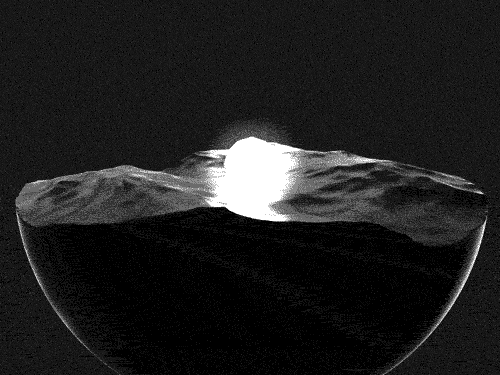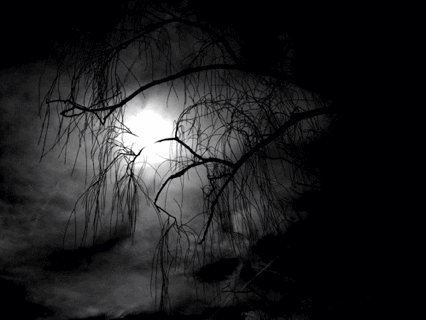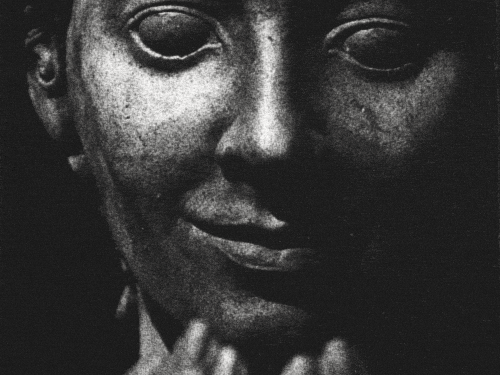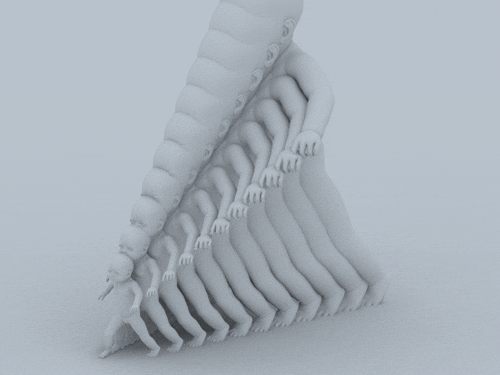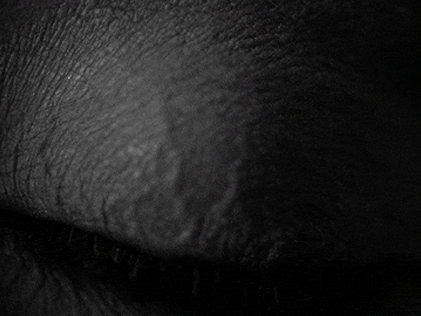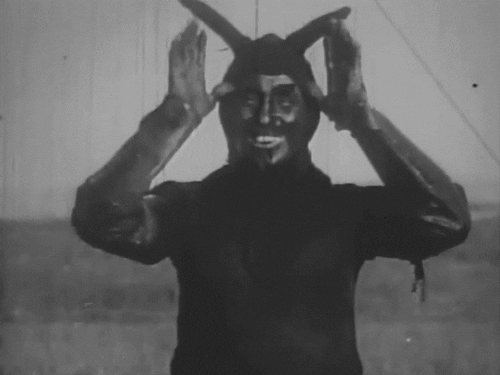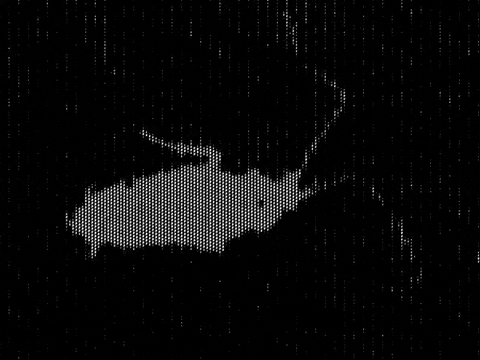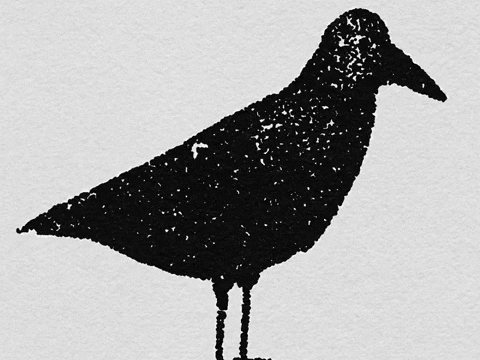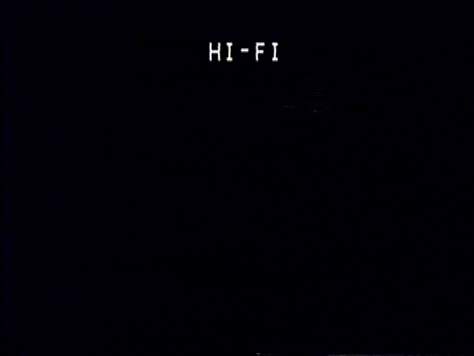By Darren Francis
Everybody goes. That is all. We are the dead, they say. You do what you can, you do what you will, until it is your time to join us.
I can feel the blackness closing in, edging at the windows I paper over to keep out its presence. Even my rooms are not safe now. How much longer will it continue? When will it cease its pursuit?
I spoke to Luise yesterday. Her voice a dry crackle on the telephone line. Ever since she lost her child her words, her moods, her deeds, have been hobbled at best. When I say her child, little Rose, was lost, I don't mean dead. She wandered into the woods one day and never came home. Luise's sorrow was profound, her mind utterly unravelled, her panoply of prescription pills scarce-touching it. Her husband, already distant, drank himself away. I still see him sometimes in one or another bar or alley, a sallow wreck of a man, a walking corpse, his life already done with but brain and biology haven't yet finished the task of offing him. Luise and I were lovers once, a moment far-past, and before Rose's disappearance I sometimes played with the idea that she was my child. After Rose was gone, with no trace of her found, I abandoned these thoughts; they led to territories my mind was reluctant to go.
The blackness, when did I first become aware of it? The blackness, when did I first sense it? It was present long before I noticed, I'm certain of that much at least, and has likely always been there beyond my initial ignorance. The knowing of it is subtle, is unprompted, is unbidden. It is pitch and it is seeping, pervading every aspect of my waking, an emotional and spiritual sickness. Death or abide are the only options in the face of it. I wish I could believe in an alternative but I don't find the evidence.
Am I the only person who can see the blackness? Does everybody else in this town look away? Play your games. Laugh with your children. Go to sleep, go to work, eat, drink, fuck, make more of you. It is blatant and it is unavoidable. Ever and always the blackness, and nor am I out of it.
Some days I am but a null zone. Some days my mind is too crowded for thought and only voices remain. Everybody goes, they say. We are the dead. You do what you can, you do what you will, until it is your time to join us.
The first time I went insane. It was two years ago tomorrow. Although there had been a steady build-up or inclination, that day marked a decisive point. Either side of it was a fuzzy and uncertain zone, one or another steady and inexorable measure dependent on medication and diagnosis. That day however nothing was in doubt. What do I remember of it? Little at all. There is only what I was later told by my ex-wife Sarah.
When I say that I remember little, this isn't strictly accurate. There are fragments, sense-impressions; white-walled room askew in a mirror, scent of recent rain and copper taste of blood, a sound I can't identify, subtle as skin cells flaking. Sarah's mouth, animate as if she were speaking. Sarah's hands reaching as if for me. All of it fading to monochrome, my mind irretrievably unlatching itself.
Insanity is very easy. I wouldn't even say there was a precise tipping-point; one often doesn't know that one is in that darkness until it is too late, by which time it has become one's regular state of being. The deranged do not know they are deranged. The dead do not know they are dead. We live this existence as if it were real, as if it mattered, but it isn't, but it doesn't. Only too late do we see. This life we walked and held as true, those words we voiced, this act we played; insubstantial as shadow and fading as quickly with the arrival of night.
Dull roots of buildings on the edge of the sky. I peer at them through tears in the newspapered-over window. Slanted roofs, slipshod slate, beat-up lead, broken roads. Sunlight curses everything. I feel blurred, smeared out of focus, a visitor in this sphere around me. Most of the time I'm neither here nor there, neither gone nor existent, neither acting or reacting. Most of the time I'm just being.
'How do you explain it?' Luise says in a voice of cinder. 'How can you? When people say "snap out of it." How can you snap out of it? You snap within yourself.'
I catch her by the window parting the curtains to look out at blanched daylight. Her physical form so vaporous, so tenuous, so slight.
'I cut off all my fingernails,' she says, 'I cut off all my toenails, I cut off all my hair, it's as if I'm trying to get rid of myself piece by piece without actually doing the deed. It's the coward's way out.'
She holds her hands to her petal mouth. Each hot tear shines like blood. Nothing now. Nowhere going. Bodies persuading us in and out of existence. I wait in a room for memories of dust to claim me. Meat, matter, residue. The kind fabrication of compassion. Love is the foible of the unwary, another unnecessary slip to distraction.
'I so wish I was stupid,' Luise says. 'I so wish that I didn't have to think these things.'
Nothing in my street any different to hers, or their street or this street or that street, sent same and seamless to skyline spent. Whenever someone goes into a room and closes the door, I always assume it is to talk about me. I can't think what I've done that they need to discuss, but why else would they do it? Would I ever know?
'You have to give people hope,' Luise says, 'even if you are about to kill them. I remember reading that the attendants in the death camps would tell those about to enter the gas chamber to be sure to remember where they left their clothes, so they'd collect the right ones when they came out, even though the attendants knew that none of them would be leaving alive.'
She presses her palms flat to her chest. See her bracelets and her rings and her brooch and her prayer beads. I look aside, away from her, as if in private reverie. If we were to fully comprehend humanity for what it is, if we were to fully comprehend the blackness for what it is, we would as a species agree to cease procreation forthwith and willingly blink out. What else is there? The only shelter is in finding like minds, to share and to suffer us against it all.
'Do you want to know the way through?' Luise says. 'The bigger picture underlying all of the pieces? See it as a fractal, self-similar on every level. In fact, don't even think of it as pieces that need to be put together. It's not a jigsaw. Each of the pieces should contain all the data you need to be able to see the whole thing.'
We talk some more, but I know that I'll scarce remember any of it a few hours after. It seems important at the time I guess. Luise nods her way through, no longer sees me when she speaks. Not lovers any more, just mutual accessories, adrift in the illusion of sharing permitted by language. It is the essence of the human brain to find patterns and connections where none are present. Sometimes it seems to me that our species is too far down the line for change to be any more than insular. History writes itself now. We're just spectators, devising new methods of watching. We have utterly recreated our world in the belief that this makes it more real. A reproduction that blurs instead of confers. It doesn't exist except in the tactile sense of making me no longer exist.
'I don't blame myself for what happened to Rose,' Luise says. 'I just wish I could have been there for her. I just wish I could have held her hand.'
She paling. She insubstantial. She parts her lips but has no further words. In a sense I'm thankful for her grief. It will take the focus off of me. I don't want to be in focus. I want to be smudged, indistinct, in the shadows. Perhaps that is what ghosts are; not the dead but the living, fading to total transparency.
I sleep on silence. Clouds banking. The sun is still-born, blind and alien. When I wake in dawn's meagre light I feel queasy, drunk with that awful sense of something within touch that you cannot reach, like when you know you have dreamed but you don't recall the details. Dreams are wretched things. For while we sleep, while we are oblivious to the conscious world, they give us unbidden glimpses of all that we can never hope to obtain. In that respect they harrow beyond comparison.
This town so shabby and nondescript. Row upon row of identical houses. Bricks aligned like printed lines. Cracked ruins in expanses of mud. Crumbling walls and barbed wire wrapped around. Burnt out estates. Dry pavements. Shards of broken bottles set in concrete. The boy walking paving slabs is me, avoiding the breaks and the gaps between, prepubescent. Thin arms, high forehead, freckles. Sometimes I stand very still. As I tread I grow taller, filling out, beginning to stoop. Hair curls at my groin and chest and armpits. I hold on to my own hands. Pass knots of evaporated trees, waste park-land, vacant lots, shattered shop-fronts. Drifting. Time passes. Time is passed. The circuits and channels in the brain switch off. Routines burn and close them down. Fragments of film and of television. Figments. Each step shorter now. Windows splinter and newspapers yellow. Walking and counting wounds. Each year another scar.
This town is a dead end. There is nil to distinguish it from any other place in the world. Nobody else who lives here can see this. They amble through, the broken and the bungled, deem what they do and where they go and what they think and what they say constitutes 'life'. That elusive fable they hold onto as definite, as now. There's something about this place that attracts the guilty and the grieving. Witness them, witness these fractured, speaking inane and with glass held to lips. The left behind. The remaindered. Nihil is replicated in their cells. And Luise's husband, missing Rose's father, is there too. See his sapless face, he counts hours and counts drinks in a clipped whisper soft as the rasp of insect wings.
Did this squalid town ever have a name? Not one that I can recall any more. But surely all places have names? Even the forgotten zones where the blackness breeds? Its residents simply refer to it as 'the town'. There is no need to give it another title because there is nothing against which to refer to it. Nobody ever leaves because there is nowhere else to go, save for the woods that surround on all sides. When I tire of the town's crooked streets and gloomy garrets I head out there sometimes, tread a slush of mud and rank leaves, mist dank and ragged between the sharp points of trees. I hear only the far calls of birds, the murmur of wind in branches. My shadow pushes me further, looming longer as the day fades. I persist, hope to find a route through the woods and out, but these trails I walk only wind in on themselves, only lead back to town. I don't mind so much. The need is gone from me.
Please don't believe a word I say. I've been creating and forgetting for as long as I can remember. I repeat each incarnation over and again until it seems more real than my memories. The trinity - the invention and the forgetting and the recall - fuzz until even I don't know what happened and what didn't. It works away at my mind while I sleep. Sows secrets, transplants memories. Part recollection and part fantasy, the bones of a life so far.
I open my eyes and don't know where I am. It could be my rooms or it could just as easily be any one of a thousand rooms in any one of a thousand skewed houses I've been in. We only find, we only learn, what we already know. Nothing else can register. I don't like the way that door opens, when it isn't my doing.
I had a sister once. I think I had a sister. Though I don't exactly recall her, the concocted memories and the stories my parents told me about her and my repeating of them and visualising them as clearly as I could until they became real has allowed me to be there with her. To revisit our moments spent together. I search the dark white of recollection. I've been thinking and believing and behaving as if my truth were evident for so long that the reality of it all is lost to me. Did it happen? How would I know? This town, did I dream it? Luise, is she a figment of me? Little Rose, is she really gone? When I was younger, and rain spotted my skin, my mother had a friend named Zoe. Zoe standing in the garden, hair wet and arms full; sometimes she held me and I knew only small hands making patterns on a window. Zoe shuffled then set out cards, me perched beside her, her face pallid and dry, told me of the days when her father took her out on the open ocean in his boat. She wide-eyed and small-framed and gazing up at him. Waves against waves and sky against sky. Salt-sharp creaking stern.
No ghost in this machine. No machine, only the blackness. Every breath I breathe is a lie, but none of that will matter, with time. Even the Danse Macabre is a human folly.
Leave the dead alone and they'll leave you alone or so my father once told me, shoes on cobbled stones, in his palm round spiders the colour of pomegranates.
The building is crumbling brick, looks like it should have been demolished years ago. Flies hang in clouds in sticky air around the doorway. A rubbish-heap blocks the entrance - soiled clothing, bags of gnawed bones torn open by rodents, a mouldy carpet folded over, once blue, now black and festering. I pull it aside. From underneath surge hundreds of insects, scurrying in search of new darknesses.
I move inside, light breaking ground ahead of me, filtered through air thick with dust-grains. After a few yards the hall turns left where the light doesn't penetrate. I hold a match to a candle, walk from room to room, flame at an angle and the scent of candle-wax my only company. Pools of stagnant rainwater. Hoops and ropes of cabling hanging from holes in the walls. In one room I find a mattress and a sleeping bag, both rank with mildew, discarded foil food-cartons stained with dried Chinese sauces. Hear the clatter of a loose window-frame caught by wind. The gutted entrails of a television. Splashes of graffiti. Rooms full of musty neglect, animal dung, the splintered remains of furniture, charred magazines and photographs.
I step into what I presume was once the lounge, but there's nothing to see there aside from a huge old sofa so black with mould that I can't even determine what colour it once was. Every sound I hear that isn't there. I keep imagining someone standing to my right; when I turn there's nobody present. Of course there's nobody present. The room creaks with every movement. A click of the door and the candle's flame flickers. I look all around me, as if expecting little Rose to peer from the shadows but I know that she won't. I know that she can't. Into another room, dismal light permeating from above where roof tiles have slipped. Nothing here but ash, the residue of deed. Away from the filtering light now, further in and darker.
'Did you find what you were looking for?' Luise asks when I emerge back onto the street.
'I don't know,' I say. 'I kept hearing things.'
'Such an old house. Things creak. You know how it is.'
'The place felt like it was haunted.'
'All houses are haunted, but not necessarily by the dead.'
I follow her for he rest of the day, watch her do all the things she does. After-images that carry us to the next single point of motion. She seems so impatient in the mess of her cells, waiting for when she can deliquesce again.
'Will you die with regret?' she says. 'Will you even consider it?'
The last time I see her; that night she steps into the woods in search of her daughter Rose, missing now nine months, and I never hear of her again. Luise just another of the gone. Her cramped rooms; her dusty space; I stand motionless in the static air. Her every future memory flickers through me. I turn them in diaphanous fingers. Her breath is all that stays.
What is there, beyond the blackness? The question itself is nonsensical. A mystic would argue that past is illusion, future is illusion, there is only now. They are right, but not in the sense that they think they are. This world we imagine we know, that we conceive ourselves a part of; what is its essence? It is bone, it is fossil, it is ghost. All that is forever around us.
Time does not exist outside of the human mind, conceived by the brain to shelter us. There is only one moment. All is simultaneous, and all is monstrous. Time separates this out, like snapshots or like the frames of a film, incomprehensible to human imagining. Thus all events are immediate. As I write these words you are reading them. You are also reading the words I have already written and the words I have yet to write. I am writing those words and another is wondering how you interpret them. Who is the other? Here with us but do you recognise their mask? Seeing all these events because time is cross-sectioned. Seeing the whole before it is cut. Time is a hologram, which is also the way of memory; every figment of my past and my future going on in my head at once and all jostling for my present attention. My days seems little more than a graveyard of all my dead moments.
Go back to your rooms, your shuttered windows, pull your doors in behind you. I was never here. Luise never left. She has always gone. I have never had her.
There are many paths that lead here. What can they teach me about the dust? Chambers dank and dormant. Point zero wishes. Forsaken gloom and monument dreaming. Ripples of nausea from sternum to throat. My bones to ashes, my skin to sackcloth. Restless in the spaces between, malignant and expanding. Where do ghosts go to when they die? Distant. Discordant. They sing for you, not me.
Dust is she and rust is she. Her blood imparts. Penumbral. Torn dawn and tainted leaves. All once intentions discarded. I know only complicity, know only sweat on my palms and dirt on my fingers. Behind my eyes and no longer need to ask. In this world, there is only what one opts to be impressed by. All else is noise.
Fairytale fever, where are you? Child of once, where are you? Shadow queen, where are you? Palliative night, where are you?
Ephemeral mist. No more than worth. I ark off days as they pass, one less until the end, a scribbled page for each sent, illegible and portending nada. Even the forgotten are chimerical whispers now, a distant charade denoting nothing. I'm no longer dismayed by their ignorance of the blackness. No matter how much I think I move on, thought will always follow.
I call out to requiem wind. There are no bells. I weep for wounded stars. There are no bells. I lullaby each dim echo. There are no bells. I straddle great black time. There are no bells.
No song to fly. No teeth of void. No memories of tomorrow. No turning of the night. No siren scars to signify. No music-box nocturne.
The end of words. Soil covers soil. My elegy for the realms I leave. Out of my sight and out of my mind in clock-face empty, in crimson fade, in noir descent. There are no birds. My mouth tastes of dead lilacs. My eyes no longer belong here. Nowhere is all that hangs. Nothing will remain but scattered seed.
Darren Francis writes and makes music. He is the author of the novels The Way We Leave, She Waits By The Water, Cutting, Alice Dee, and Belong, the non-fiction Laylah: The Life of Leila Waddell, and the spoken word-with-music albums Becoming Ahenaten, All Things Left On Earth, Left At the Luna Mansion, Open The Dog, Uforia, Future Ghosts, and God Thing. He was a member of the industrial band Cubanate in the mid-1990s, and has recorded six albums with the band Logos. He is currently working on another book and another album. His website is darrenfrancis.co.uk
